
- Index
- Binding
- Conflict
- Industry
- Signed
- Signed By
- Absalom Baird (4)
- Ambrose Burnside (7)
- Charles Devens (2)
- Doris Kearns Goodwin (2)
- Frederick Phisterer (3)
- General Fitzhugh Lee (2)
- Henry Mizner (3)
- Jack Davis (4)
- John A. Dix (5)
- John Geary (2)
- Nathaniel Banks (2)
- Neal Dow (3)
- Nelson A. Miles (2)
- Oliver O Howard (2)
- P.g.t. Beauregard (2)
- Philip Sheridan (3)
- Robert Anderson (18)
- Sitter (17)
- Ulysses S. Grant (2)
- William T. Sherman (2)
- ... (4119)
- Theme
- Americana (9)
- Antique (2)
- Army (3)
- Art (5)
- Celebrities (2)
- Civil War (11)
- Civil War General (2)
- Conflicts & Wars (7)
- Cosplay (2)
- History (11)
- Man, Portrait (2)
- Militaria (1137)
- Militaria, People (5)
- Militaria, Portrait (4)
- Military (2)
- Military & Adventure (13)
- Politics (6)
- Portrait (30)
- Portrait, Man (22)
- ... (2931)
Civil War Brigadier General James Robinson Letter 1864
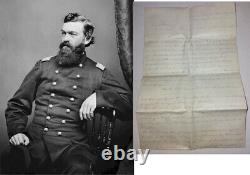

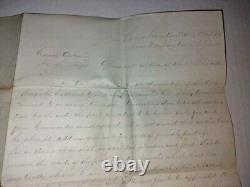



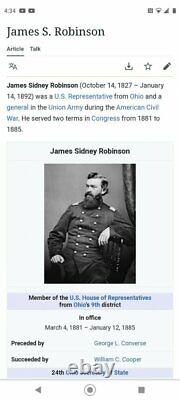
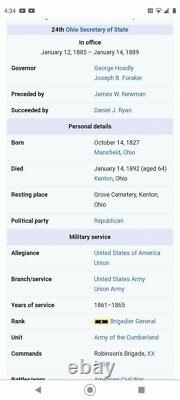
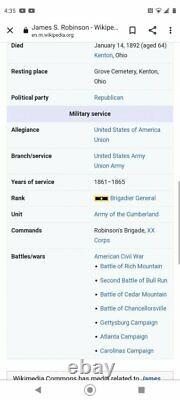


Civil War Photos Letters Photos Posters Memorabilia Collectibles For Sale. Civil War - Brigadier General James Sidney Robinson. Original Antique Civil War Letter, 1864. Amazing Content - His Transfer to Sherman's March to the Sea. Incredible piece of American & Civil War History! Original handwritten letter in antique fountain pen ink. Brigadier General James Sidney Robinson writes an emotional letter to his troops mentioning their several battles and his upcoming transfer to Sherman's March to the Sea. Although we have acquired numerous Civil War letters over the years, this is the most important content of them all. General James Sidney Robinson would return to civilian life and become a two term US Congressman. Letter transcript (question mark means I'm unsure what is written). Officers and soldiers of the 3rd brigade. The time has come for the dissolution of this old brigade hallowed by so many pearls United by so many trials and honored by so many triumphs. Associations dear to us all reaching far back into the past are about to be broken and you and your commander must separate. It is not unmet that at this time he should address you in a few words of friendly partying in so doing it is with unqualified pleasure and? That he reviews the events of the past 14 months which have been mutually shared by us. Of March 1864 it became the Good Fortune of him who addresses you to be appointed to the command of one of the best and bravest brigades in Shermans Grand army. Of May we broke our camp at Bridgeport Ala and moving over the classic steeps of lookout we marched out to meet the enemy at ressaca? On the 14 you performed one of the most brilliant deeds of the glorious campaign of Atlanta dashing in at the opportune moment you bravely met the advance of an exultant foe and by your very spirit and? Drive him back and turned disaster to triumph. On the following day you advanced and occupied and exposed pastor in the extreme? And held it against two determined assaults of the enemy.
After the storm of battle ceased and the shadows of evening fell with the? Yourself in gathering from the field the wounded which a brave but beaten foe had left in your hands by his hasty flight. The 25 was the day of New Hope? A glorious and ever memorable for you and your country, under the eyes of your gallant division corps army and department commanders you formed your line and swept grandly forward driving the enemy before you more than a mile and holding for hours and exposed pasture close to the enemies ranks. For this gallant action you were liberally complimented upon the field by brigadier General Williams commanding the division and Major General Hooker commanding the corps.
Both of whom accompanied you and witnessed your courage and gallantry. I need hardly recall to you the bloody day of Peachtree Creek a day ever fresh in your memories to every man of this command who assisted in meeting and so??
Repulsing the enemies desperate efforts to surprise and break over unsheltered? Lines on that day your commander and your country accinds? Of hero the setting Sunshine upon a field strewn with the forms of many of your brave comrades but victory perched upon your?? And powder stained with her brightest laurels? And patience during the siege of Atlanta and fortitude and endurance throughout the grand march to Savannah and the still grander one from Savannah to Goldsboro have?
A nation's gratitude and the admiration of a civilized world. You proved that the fatigue and? Of a weary march of 800 miles through the enemies country had not neutralized your old gallantry and? Then that of the 3rd brigade of the old red star division. Let us remember at this hour of partying our fallen comrades whose graves are strewn from the Tennessee's to the Chattahoochee and among the pines of North Carolina, their fate should rather be envied then mourned and their enemies should even inspire us with renewed devoture?
To the great and good cause for which they gave their lives. My best wishes following you wherever you may go I shall ever expect that in the future as in the past you will be an honor and an?To the country you have helped to save. James Sidney Robinson (October 14, 1827 - January 14, 1892) was a U. Representative from Ohio and a general in the Union Army during the American Civil War. He served two terms in Congress from 1881 to 1885. Born near Mansfield, Ohio, Robinson attended the common schools.
As a young man, he acquired the art of printing. He moved to Kenton, Ohio, on December 31, 1845. Entering the newspaper business, he edited and published the Kenton Republican. He was the Chief Clerk of the Ohio House of Representatives in 1856. At the beginning of the Civil War, he enlisted in the 4th Ohio Infantry on April 17, 1861, and was soon made a captain. He took part in the operations at Rich Mountain in western Virginia and then was promoted to the rank of major in October 1861.Frémont in the Shenandoah Valley, and became a lieutenant colonel in April and colonel of the 82nd Ohio Infantry in August 1862. He was engaged at the Cedar Mountain, the Second Battle of Bull Run, and Chancellorsville in XI Corps. Robinson was severely wounded in his chest at Gettysburg while leading his retreating troops into the borough on the first day of fighting. After a lengthy recuperation period, Robinson commanded a brigade under Maj.
Joseph Hooker and then under Maj. He participated in the 1864 Atlanta Campaign and later in Sherman's March to the Sea (he discusses in this letter). During the Carolinas Campaign, he fought at the Battle of Bentonville. Robinson was commissioned brigadier general of volunteers on January 12, 1865. General Robinson was mustered out of the army on August 31, 1865.On July 9, 1866, President Andrew Johnson nominated Robinson for appointment to the grade of brevet major general of volunteers to rank from March 13, 1865 and the United States Senate confirmed the appointment on July 23, 1866. In January 1880, he was appointed as a commissioner of railroads and telegraphs for the state. Robinson was elected as a Republican to the Forty-seventh and Forty-eighth Congresses and served from March 4, 1881 to January 12, 1885, when he resigned. He then served as the Secretary of State of Ohio from 1885 to 1889. Robinson died in Kenton, Ohio, on January 14, 1892.
He was interred there in Grove Cemetery.
